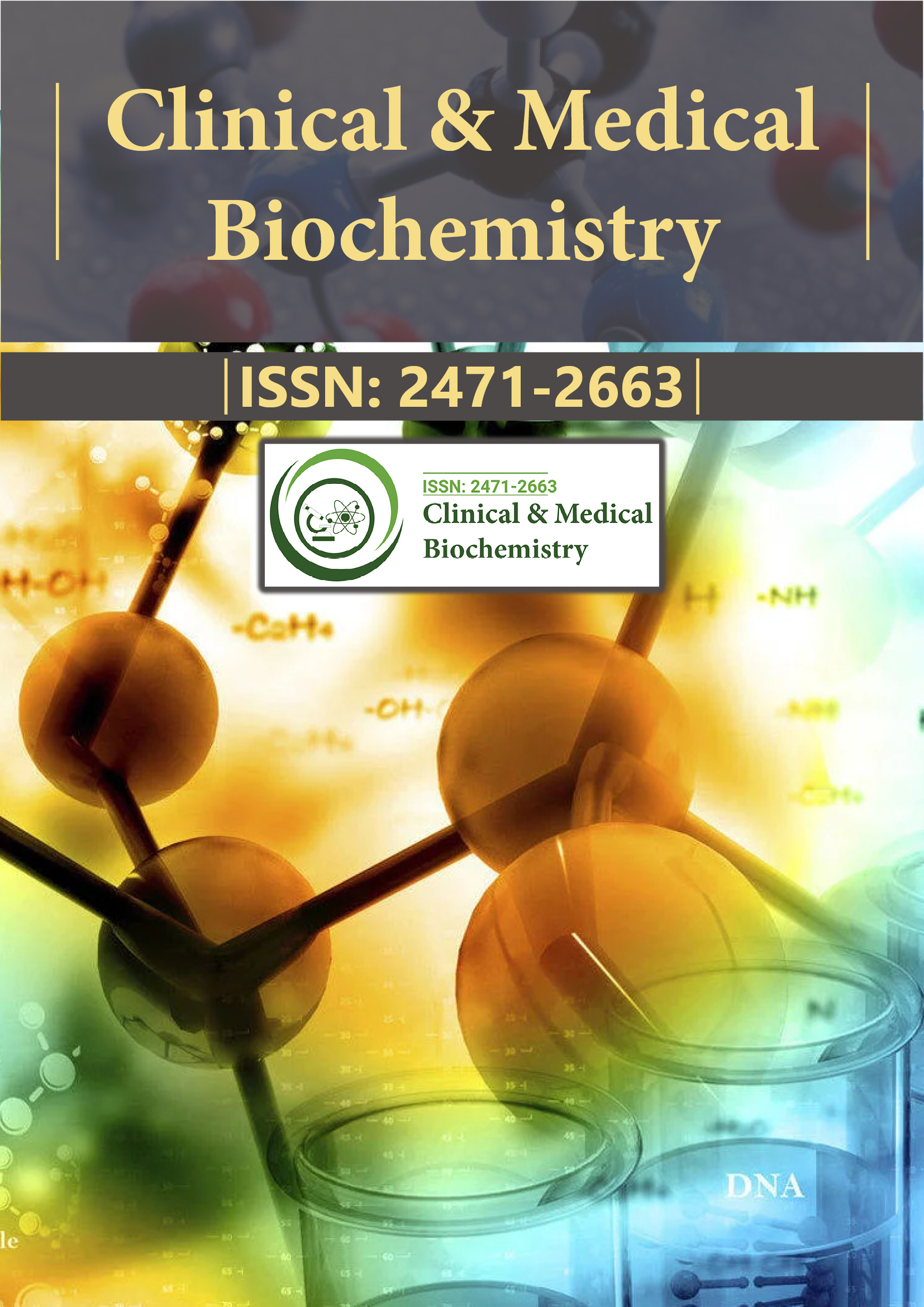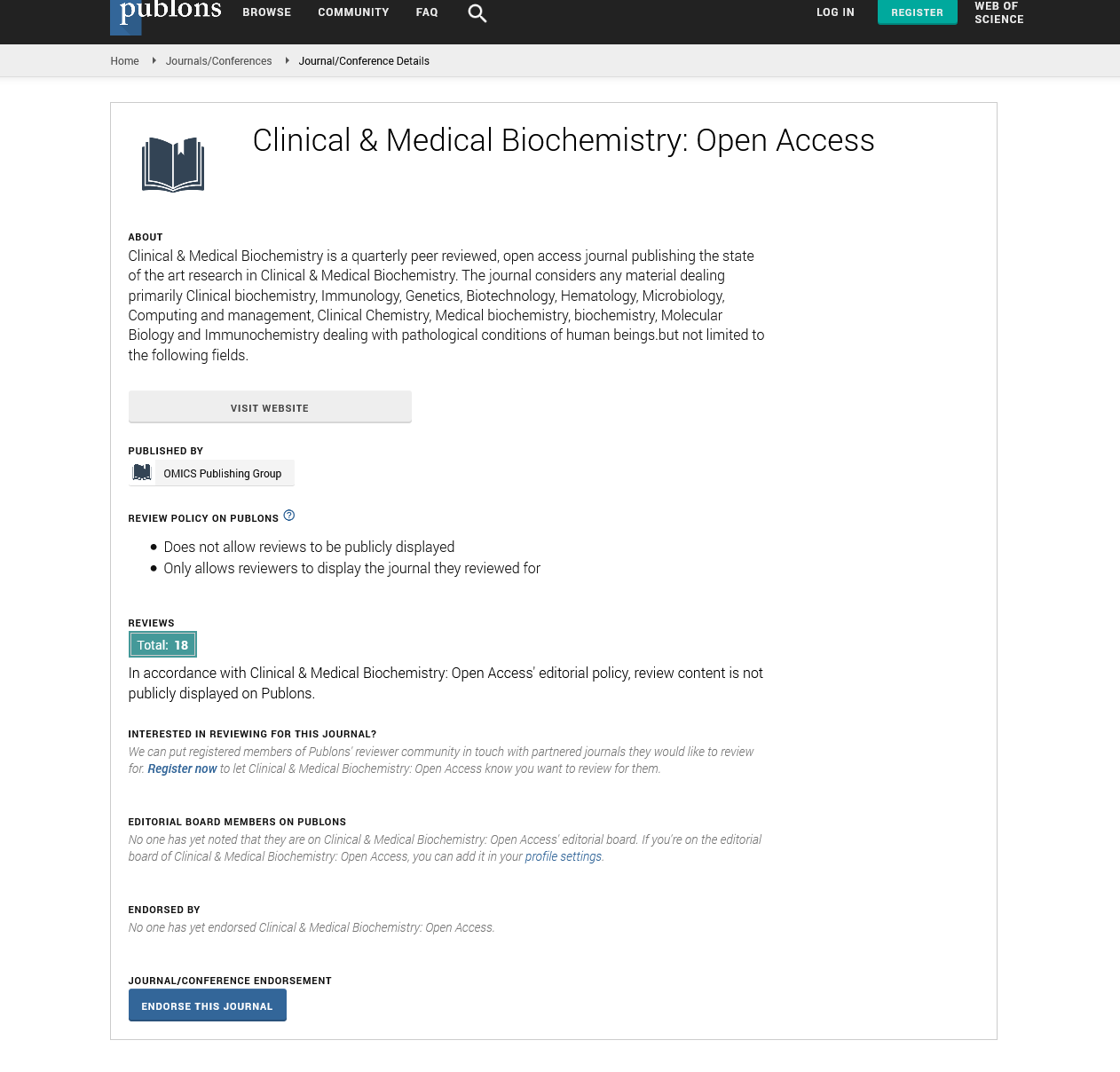Indexed In
- RefSeek
- Directory of Research Journal Indexing (DRJI)
- Hamdard University
- EBSCO A-Z
- OCLC- WorldCat
- Scholarsteer
- Publons
- Euro Pub
- Google Scholar
Useful Links
Share This Page
Journal Flyer

Open Access Journals
- Agri and Aquaculture
- Biochemistry
- Bioinformatics & Systems Biology
- Business & Management
- Chemistry
- Clinical Sciences
- Engineering
- Food & Nutrition
- General Science
- Genetics & Molecular Biology
- Immunology & Microbiology
- Medical Sciences
- Neuroscience & Psychology
- Nursing & Health Care
- Pharmaceutical Sciences
Perspective - (2025) Volume 11, Issue 1
Biotechnology Tests: Bridging Molecular Science and Real-World Applications
Sander Vernino*Received: 26-Feb-2025, Manuscript No. CMBO-25-29227; Editor assigned: 28-Feb-2025, Pre QC No. CMBO-25-29227; Reviewed: 14-Mar-2025, QC No. CMBO-25-29227; Revised: 21-Mar-2025, Manuscript No. CMBO-25-29227; Published: 28-Mar-2025, DOI: 10.35841/2471-2663.25.11.238
Description
Biotechnology tests are scientific procedures and laboratory techniques that utilize biological systems, organisms, or their derivatives to develop products, detect changes in living systems, or diagnose various diseases. These tests are applied across a wide range of fields, including medicine, agriculture, pharmaceuticals, environmental science and forensic analysis. The growing role of biotechnology in health and industry has made such testing essential for innovation, quality control and problem-solving in complex biological environments. Biotechnology tests combine principles of biology, chemistry, genetics and engineering to investigate and manipulate life at the molecular level.
The development and application of biotechnology tests are rooted in understanding DNA, RNA, proteins, enzymes and cellular mechanisms. These tests are typically used to detect genetic mutations, identify pathogens, assess gene expression and monitor cellular changes. In healthcare, biotechnology testing is essential in diagnosing genetic disorders, infectious diseases and cancers. Polymerase chain reaction (PCR), for example, is one of the most commonly used biotechnology tests. PCR amplifies DNA segments, allowing for the detection of specific genetic sequences. This technology played a central role in identifying viral infections, including HIV and, more recently, COVID-19.
Other widely used biotechnology tests include Enzyme-Linked Immunosorbent Assay (ELISA), which detects antigens or antibodies in blood samples and Next-Generation Sequencing (NGS), which enables comprehensive genetic analysis of entire genomes or specific gene panels. These tools have revolutionized precision medicine by allowing doctors to tailor treatments based on an individual’s genetic profile. In cancer care, biotechnology tests can identify tumor-specific mutations, guide the use of targeted therapies and predict treatment responses.
In the field of agriculture, biotechnology tests are used to develop and monitor Genetically Modified Organisms (GMOs), assess plant disease resistance and improve crop yields. DNA-based techniques help plant breeders track desirable traits such as drought tolerance, pest resistance, or faster growth. These tests ensure that food production is more efficient and sustainable while meeting regulatory safety standards. In livestock management, biotechnology tests help detect hereditary disorders, manage breeding programs and ensure animal health through pathogen screening.
Environmental biotechnology also relies on testing to monitor pollution, detect hazardous substances and manage waste. Microbial assays can identify the presence of harmful bacteria in water or soil, while biosensors and genetically engineered microbes are used to assess the biodegradability of waste materials. These tools are essential in environmental conservation, industrial cleanup and ensuring ecological balance.
In forensic science, biotechnology tests have transformed criminal investigations. DNA fingerprinting, a form of biotechnology testing, can match suspects to biological evidence left at crime scenes with high accuracy. This technology is also used in paternity testing and in identifying unknown remains in mass disasters or war zones. Its reliability and scientific rigor make it a critical tool in legal contexts.
Biotechnology tests are highly regulated to ensure accuracy, safety and ethical compliance. Quality assurance, standardization and validation of testing protocols are vital, especially in medical and food industries where public safety is a concern. Regulatory bodies such as the FDA, WHO and EMA provide guidelines on the approval and application of biotechnology-based diagnostics and treatments. Rigorous clinical trials and quality checks are necessary before a test is approved for widespread use.
Despite their wide application, biotechnology tests also come with challenges. One major issue is the cost, particularly for advanced tests such as genetic sequencing or proteomics. The requirement for sophisticated equipment and highly trained personnel can limit access in low-resource settings. Ethical considerations, especially around genetic testing, privacy and data security, must also be addressed. There are ongoing debates about how genetic data is used, stored and shared, particularly with the rise of direct-to-consumer testing companies.
Moreover, interpreting biotechnology test results often requires specialized knowledge. A test may reveal genetic predispositions that do not always lead to disease and false positives or negatives can cause unnecessary anxiety or missed diagnoses. Therefore, integration of biotechnology tests into routine practice demands a multidisciplinary approach involving clinicians, genetic counselors and laboratory scientists.
Conclusion
In conclusion, biotechnology tests have become indispensable tools in modern science and medicine, offering powerful means to explore, diagnose and address biological challenges. From healthcare and agriculture to environmental management and forensic science, these tests have improved our ability to detect, understand and manipulate living systems. The rapid pace of innovation in molecular biology and bioengineering continues to expand the potential applications of biotechnology testing, promising more accurate, faster and more personalized approaches to health and industry. However, challenges related to accessibility, ethics, cost and interpretation remain and must be carefully managed to maximize the benefits of this technology. As research continues and global collaboration grows, biotechnology tests will play an increasingly vital role in shaping a healthier, safer and more sustainable world.
Citation: Vernino S (2025). Biotechnology Tests: Bridging Molecular Science and Real-World Applications. Clin Med Bio Chem. 11:238.
Copyright: © 2025 Vernino S. This is an open-access article distributed under the terms of the Creative Commons Attribution License, which permits unrestricted use, distribution and reproduction in any medium, provided the original author and source are credited.

